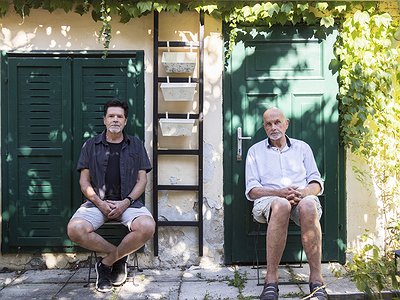Part 2
What tend to be the best collaborations in your opinion – those with artists you have a lot in common with or those where you have more differences? What happens when another musician take you outside of your comfort zone?
HJR: In the beginning for example, when Moebius and I started to work with Eno, I was sometimes not able to follow Brian’s and Moebius’s ideas – either their approach, or what technically was possible with the equipment and especially the huge mixing table that Conny worked with. So I was sometimes frustrated because the two worked easily together, because they knew much better than I how to get along with all those tools. I couldn’t participate in the creation of some of the tracks for the album After The Heat which depressed me a lot.
But in the end, the two just reacted very kindly, their argument was …
”Achim, you’re here with us and Conny and even if you can’t fully co-write some of the structures of some tracks, without your presence none of the tracks would have seen the light of the day ...”
TS: I couldn’t put it better. No matter what else, a great collaboration takes a deep commitment, but also a little bit of a thick skin – to allow things to proceed in a direction you might not be ‘feeling’ at the moment, to cheerfully abandon your own idea because it just isn’t clicking.
Do you need to have a good relationship with your collaborator? Or can there be a benefit to working with someone you may not get along with on a personal level?
HJR: Of course a good relationship is undeniable.
TS: I usually collaborate with people that connect with me personally on some level.
That said, I think wonderful things can happen when there is some tension - so many bands for example have made an album you love, and you later find out there were difficulties and real disharmony along the way. If you took out that edge, it might have been a complete failure.
But collaboration takes trust, and trust usually presumes some personal connection.
Some artists feel as though the creative process should not be a democratic one. What are your thoughts on the interaction with other musicians, the need for compromise and the decision making process?
HJR: If there is an open door for discussion and understanding within the circle of actors, everything should be easy to clear up if it comes to problems.
TS: If a solo work is a dictatorship, a collaboration has to be a democracy. In the former, you have to set aside other people’s suggestions, criticisms, approval, and be ruthless in the self-editing. It’s your vision, you have to keep a firm inspired hand on what goes in and what stays out.
With collaborators, a dictatorship will usually quickly and painfully end the collaboration! If you didn’t want the 50/50 input of another artist, you probably didn’t want to collaborate in the first place.
In Achim and my circumstance, I have the studio and do the final manipulations and editing and mixing, so the authoritarianism does creep in, and it’s something I really have to be aware of. Ruthless editing of my own work is natural for me, but I have to stay conscious when it’s the other person’s contribution I’m messing around with.
But there’s always a trust in the music itself – Achim and I never keep score of who does what, and what goes and what stays. When a piece is working and it’s communicating and we can listen and say ‘yes, wow’, all those nuts and bolts decisions just happily disappear.
Really, those are the best collaborations, when everything is unselfish and in service to the music and nothing else.
What's your take on cross-over collaborations between different genres?
HJR: I like it very much, a recent example, a rework of a Bach piece:
TS: All of Achim’s career has been a cross-over! I dare say he’s had a hand in inventing more genres than most musician’s have dabbled in.
I think both of us take a little pleasure in subverting genres, or at least ignoring them. Might have been Debussy that said “rules are made by works of art, not for works of art.”
4 Hands itself probably straddles a lot of genres, and I can say that those considerations occupy about 0% of our thoughts when we make music.
In a live situation, decisions between creatives often work without words. How does this process work – and how does it change your performance compared to a solo performance?
HJR: I’m not able to answer the question of HOW it works with words. Either it works or doesn’t.
I’m friends with Tim and all those creatives I talked about earlier, and this is somehow like a guarantee for a relevant collaboration, ingredient-wise. There is no real difference between solo and collaboration, because to work on something, I have open my mind and my ears, either here or there.
There are many descriptions of the ideal state of mind for being creative. What is it like for you as part of a collaboration? In which way is it different between your solo work and coollaborations?
TS: Both ways need the same state of mind. Awareness, consciousness, care, love, devotion.
Collaborating with one's heroes can be a thrill or a cause for panic. Do you have any practical experience with this and what was it like?
TS: I really SHOULD have panicked. Working with Achim Roedelius, Dieter Moebius, Harold Budd and others would have normally brought on a flood of self-doubt.
But a funny thing happens when you work with humble, wonderful creative people – a few moments into the process, when you realize they are also just searching for something meaningful and resonant, and there’s nobody you need to impress, it just allows you to dive in.
That said, playing live is still pretty terrifying when you’re working with legends, there’s always that little inner voice: ‘please, please don’t f*ck up!”






